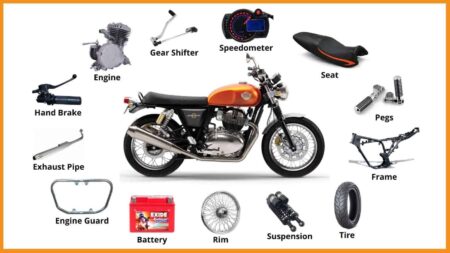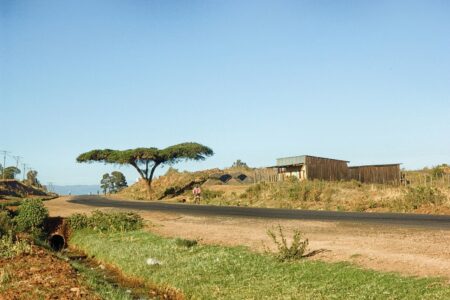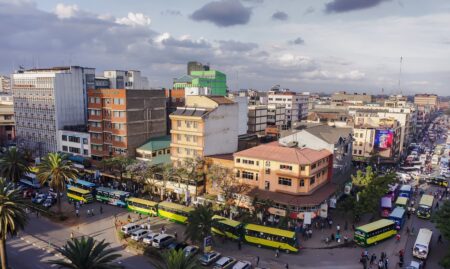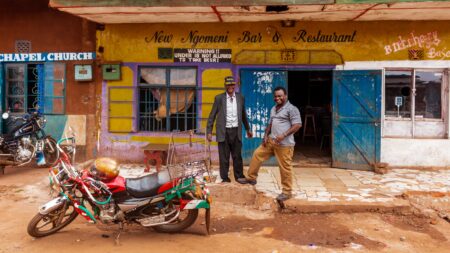The motorcycle spare parts retail sector in Kenya faces numerous challenges that have weighed vendors down. Although the sector is dynamic and an essential component of the country’s economic gains, it operates like any other business. In this blog post, we’ll delve into the key obstacles faced by motorcycle spares retailers in Kenya and explore strategies to overcome these challenges, ensuring the sustained growth and success of businesses in this critical industry.
1. Economic Fluctuations
One of the main challenges faced by motorcycle spares retailers in Kenya is the impact of economic fluctuations. Changes in economic conditions can influence how motorcyclists spend their cash, affecting the demand for spares. Economic downturns may lead to reduced purchasing power among customers, impacting the overall sales and profitability of retailers. Ways to tackle this challenge include diversifying product offerings to cater to various budget segments. Also, implement cost-cutting measures during economic downturns. Explore partnerships with financing institutions to offer installment plans.
2. Disruptions in Supply Chain
Motorcycle spares retailers heavily rely on a smooth and efficient supply chain. However, there can be unavoidable global or local disruptions that affect the supply of spare parts. This can lead to stock shortages, delayed deliveries, and high costs.
As a spares shop dealer, ensure you build strong relationships with reliable suppliers and manufacturers. Also, maintain a diversified supplier base to mitigate risks. To secure your business, develop contingency plans for alternative sourcing during disruptions.
3. Counterfeit and Substandard Products
The prevalence of counterfeit and substandard motorcycle spares in the market poses a significant challenge for retailers. Some clients won’t have the time and knowledge to peruse through the products’ quality standards, putting them in harm’s way. Dealing with counterfeit products not only harms the reputation of the business but also jeopardizes the safety of riders.
Ensure you perform due diligence and source spares from reputable suppliers and manufacturers. Further, educate customers on how to identify genuine products, especially boda boda riders who may risk the safety of clients. Collaborating with regulatory authorities to address counterfeiting issues when you encounter them is also a wise step.
4. Technological Changes
Technology is catching up in all business sectors and the motorcycle industry is also evolving rapidly, with frequent advancements in functionality and design. Keeping up with these changes and ensuring that the inventory aligns with the latest motorcycle models and technologies can be a significant challenge for retailers.
To navigate this challenge, stay informed about industry trends and technological advancements. Don’t underestimate its impacts, even as a local retailer in a small town or village.
You should also establish strong relationships with suppliers offering the latest products to stay ahead of the times. Ensure you invest in staff training to enhance product knowledge. A knowledgeable staff is a profitable staff.
5. Seasonal Changes that Affect Demand
The demand for motorcycle spares in Kenya can experience variations based on seasonal factors. For instance, certain spares may be in higher demand during specific weather conditions or festive seasons, leading to challenges in managing inventory and predicting consumer needs.
As a first-timer in North Eastern Counties, you may be shocked when flash floods occur, changing the trajectory of supplies customers demand. Key strategies to avert this include monitoring and analyzing seasonal trends to adjust inventory levels. For those who haven’t set up premises, research to know the weather trends of where you’ve settled.
Offer seasonal promotions to stimulate demand during slow periods. Moreover, diversify product offerings to cater to different seasonal needs. Anticipate and be equipped for all weather changes.
6. Competition from Informal Markets
The presence of informal markets and street vendors selling motorcycle spares poses a challenge for formal retailers. The fact that some informal markets aren’t regulated presents even greater hurdles.
Informal markets often offer lower prices, attracting cost-conscious customers away from established retail stores. You can maneuver these challenges by differentiating the business by providing superior customer service. With a better platform, maximize the resources and avail better services. To set yourself apart, emphasize the authenticity and quality of products. Clients who prefer authentic goods rarely defect to lower-quality items.
7. Lack of Industry Regulation
The motorcycle spares industry in Kenya may lack standardized practices and regulations, leading to challenges in ensuring product quality and consistency. The absence of industry standards can contribute to the proliferation of substandard products. To tackle this, advocate for industry standardization and regulatory frameworks.
Even in your business locality, you can advocate for better practices. Collaborate with industry associations to establish quality benchmarks. Collaboration gives you more leeway and voice of authority. Ensure you communicate the quality assurance processes to customers.
8. Limited Access to Financing
Access to financing can be a challenge for motorcycle spares retailers, particularly smaller businesses. Limited financial resources may hinder retailers’ ability to invest in technology, expand their inventory, or implement marketing strategies. Solutions include exploring partnerships with financial institutions for favorable terms.
There are financial institutions always looking for businesses to fund. Consider government-sponsored financing programs. County governments can also set up these financing programs that you can take advantage of. Pro Tip: Optimize cash flow management to maximize available resources.
9. High Operating Costs
Operating costs, including rent, utilities, and employee salaries, can be relatively high for motorcycle spares retailers. These costs can impact the overall profitability of the business, especially during periods of economic uncertainty. However, there are strategies to navigate high costs. They include negotiating with suppliers for bulk purchase discounts.
Bulk purchase helps minimize costs. Also, optimizing operational efficiency to reduce overhead costs is timely. Explore shared or flexible workspaces to minimize rental expenses. Rental workspaces are a menace for many businesses, depending on the location of the premises.
10. Lack of a Digital Presence
The digital world is becoming increasingly important for businesses to connect with customers. Motorcycle spares retailers with limited or no digital presence may struggle to reach a broader audience and compete effectively in the market.
You should invest in a user-friendly website and e-commerce platform. The website should have a list of products and services on offer that customers can easily check. Leverage social media for marketing and customer engagement.
A bulk of business interactions take place on social media sites, including customer reviews and referrals. To boost your business online, implement digital marketing strategies to enhance online visibility. Digital marketing will not only grow your reach but also help to retain customers.
While motorcycle spares retailers in Kenya face a range of challenges, proactive strategies and a resilient approach can help overcome these obstacles. By staying informed about market trends, building strong supplier relationships, and embracing technological advancements, retailers can position themselves for sustained success in the ever-evolving landscape of the motorcycle spares industry. Additionally, advocating for industry standardization and collaborating with stakeholders can contribute to the overall growth and professionalism of the sector, ensuring a thriving future for motorcycle spares retail in Kenya.












8. Limited Access to Financing, is a major challenge